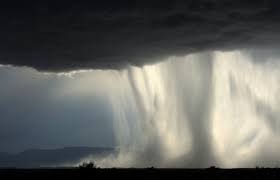Perthblog
Could a Cloud Attack Lead to a Global Depression?

Tech earnings were up significantly in the last quarter. This was at least partly due to significantly increased earnings from the Cloud by Microsoft, Amazon and Google. When Microsoft gets earnings from anything other than its legacy products it’s worth sitting up and taking notice. This time it aced the market for the first time in a long time. So something's going on.
You don’t have to be a genius to know that the Cloud is roaring. Everything is moving there. Even my small company. We have just been forced to move all our documents to the Cloud due to a problem with our library’s size. Bit of a bummer actually, now we have to change our way of working.
Not that we are not already there. Not just our documents. Our financial system. Core application systems. Marketing and sales systems. Not much left down on the old PCs any more. Hardly need any disk drives any more, or at least not big ones.
And it’s not just companies. How about all those personal photos? Videos?
What is happening to us in my company and to individuals is just a tiny reflection of what’s going on globally, especially in the developed countries. Everything is gradually migrating to the Cloud because of its lower costs, convenience and flexibility.
From the perspective of human organization we are now actually in the midst of a revolution. It’s impacting just about all organizations, private and public. You can call it the Cloud Revolution. It’s the successor to the Industrial Revolution.
That means that most of our critical data and systems are moving off huge numbers of privately-operated computers in millions of organizations to a relatively small number of Cloud providers who have taken over the responsibility of stewardship of these resources.
From a systems perspective we have moved from a multicultural systems model and are rapidly moving towards a global systems monoculture. That monoculture is based on a small number of providers, a very small number of operating systems and technical platforms and a small number of locations, albeit distributed.
You can see where this is going. When systems were globally distributed over millions of computers, distributed relatively globally, it was pretty hard for any one failure to affect all global systems. But in a global systems monoculture, even a problem that affected just one or two providers, say Amazon and Google could have an enormous global impact.
For the sake of convenience let’s call this a “Cloud-Burst”. A Cloud-Burst is an event that prevents data-owners to get access to or use their data and systems in the Cloud. It could be temporary or permanent. Either would not be good.
Let’s say Amazon Web Services went down, for whatever reason. How many hundreds of thousands or even millions of companies and organizations would able to function? How would this impact their clients, suppliers and partners?
Clearly there would be enormous disruption. It would impact probably millions of businesses all over the world. That would impact employment, revenues and operating profits.
In turn that could devastate the economies of entire regions and countries, even the largest like the US. In turn that could catalyze political disruption and even military conflict.
One could imagine situations similar to the one that caused the outbreak of World War I, the assassination of Archduke Franz-Ferdinand. An apparently inconsequential computer problem leading to other unpredicted consequences on a global scale. Possibly in a totally unintended way as far as any of the players were concerned, even if the attacker were hostile.
How would all this happen? It’s pretty clear I think. You could have countries hacking the major Cloud providers for one. I personally think that the militaries and other nefarious non-State players would almost certainly be already making plans to take down the Cloud providers. The increasing spate of hacking attacks has demonstrated how effective these parties can be and how difficult it is to prevent or deter them.
Another possibility is EMP – Electro-Magnetic Pulse – bombs. It’s certain that some State players, including some very nasty ones, already have these. A couple of these exploded over the US could take out most of the Cloud providers, not to mention our national grid and so on. That might be less likely since the US would probably know the source of the attack and respond to the attacker. But it’s certainly a possibility.
So the odds are that a Cloud-Burst would come from hacking. It could come at any time. The more we all migrate to the Cloud, the more attractive an attack would be, not least because the perpetrator might well be able to conceal its identity. The result of the attack could be a global depression, military conflicts and even political revolutions.
The world seems to be entering a major economic slowdown. That raises the usual litany of analyses concerning how severe it will be. Another global recession? If so, how deep? When will we recover, if ever? What about the possibility of deepening deflation and secular stagnation: a global mirroring of what’s been happening in Japan?
Of course, all of these are on the cards. But as Nassim Taleb has reminded us, you can also get a Black Swan event. A Cloud-Burst has got to be up there in terms of likelihood. In other words, in reading the future, it might not be economic or financial events or trends at all that could be the decisive drivers of global economic activity.
The momentous move to the Cloud could lead to totally unpredictable events whose impact might be even more devastating politically than economically, hard as that might be to imagine.
Batten down the hatches, I think.
When you subscribe to the blog, we will send you an e-mail when there are new updates on the site so you wouldn't miss them.
